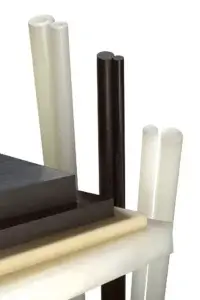PA 6 and PA 6.6 sheets:
Durable, tough and versatile
PA 6 (polyamide 6) and PA 6.6 (polyamide 6.6) sheets represent high-quality plastic products that are characterized by their durability, toughness and versatility.
Characteristics and applications of PA 6 and PA 6.6 sheets:
Properties:
- High strength:
PA 6 and PA 6.6 sheets offer high mechanical strength, which makes them suitable for demanding applications. - Toughness:
They are tough and resistant to impact, which extends their range of applications in stressful environments. - Good sliding properties:
Polyamides have good sliding properties, which makes them suitable for applications with dynamic loads. - Chemical resistance:
PA 6 and PA 6.6 show good resistance to many chemicals. - Good machinability:
The panels are easy to cut, drill and shape.
Applications:
- Mechanical engineering:
PA 6 and PA 6.6 sheets are used in the manufacture of bearing parts, gearwheel and gear components.
- Vehicle construction:
Used in the automotive industry for bumpers, interior trim and other structural parts.
- Electrical industry:
PA sheets are used for electrical insulators, housings and connectors.
- Consumer goods:
Used in the manufacture of housings for electronic devices, sports equipment and household goods.
- food industry:
Due to their food-safe properties, they are used in food processing for cutting boards and work surfaces.
PA 6 and PA 6.6 sheets offer an optimum combination of strength, toughness and processability.
Their versatile properties make them the preferred materials in various industries where durability and resilience are required.

